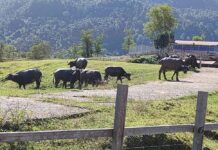GO out, develop technologies, and let everyone learn, use, and benefit from these technologies especially the local rural economies.” These are the words of Ted McKinney, the USDA Undersecretary for Trade and Foreign Agricultural Affairs during the opening ceremonies of the webinar series organized by the Asia Pacific Economic Cooperation (APEC) High Level Policy Dialogue on Agricultural Biotechnology (HLPDAB) that runs from August 17-19, 2020.
McKinney stressed the importance of innovations in agricultural biotechnology that would benefit the poor and hungry people in rural communities. He delivered the message to some 90 participants that include scientists, regulators, communicators, and private sector representatives.
The Undersecretary explained that with the increasing number of nutritionally stressed population, wars, frequent global natural disasters, and the current COVID-19 pandemic, economies around the world must act diligently and conscientiously to remove all barriers that will prevent the adoption of agricultural technologies, especially precision breeding techniques. He added that the global community opened to the agricultural opportunities associated with the green revolution because of mounting challenges in the past. It is logical that with the current more severe challenges, new technologies must be accepted to benefit more people.
The APEC HLPDAB should have been hosted (if not for COVID-19) in the island of Penang by the Malaysian Agricultural Research and Development (MARDI). Nevertheless, Datuk Dr. Mohamad Roff b. Mohd Noor, Director General of MARDI expressed his support to this initiative in his message. He underscored the influx of digital technology not only in the fields of knowledge sharing and communication but also in scientific endeavors for food sustainability. He said that economies need to build sustainability roadmaps using technologies such as genome editing to increase knowledge and understanding of their relevance and benefits to the global population.
The APEC project is a six-part webinar series conducted over four days and implemented under the HLPDAB. The first two webinars focused on the socio-economic benefits of genetic engineering for sustainable integrated production systems, and how to navigate the path towards the trade and commercialization of these products. The next two webinars examined the benefits of genome editing technologies and how these technologies can empower communities by encouraging innovation and commercialization. The final two webinars will involve hands-on interactive exercises to build the capacity of participants to craft effective communication messages to convey the benefits of gene editing through the use of practical tools and strategies. The series is envisioned to end with the next steps and a vision of what is expected beyond 2020.
ISAAA’s Global Coordinator Dr. Mahaletchumy Arujanan and SEAsiaCenter Director Dr. Rhodora Romero-Aldemita participated in the planning of the webinar series and moderated the two sessions on genome-editing.
For more on developments in genome editing, visit ISAAA’s Genome Editing Resource.

















